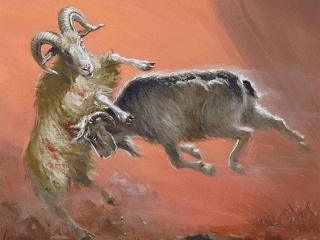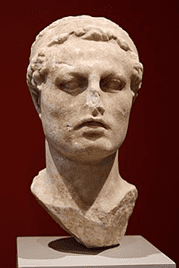Introduction to Daniel’s prophecies
Daniel was taken captive and transported to Babylon when Nebuchadnezzar’s army subdued Jerusalem 605 BC. Conservative scholars believe Daniel wrote his book while he was in Babylon and completed it by 530 BC shortly after the capture of Babylon by Cyrus in 530 BC. The theme of his book is: The Most High God is sovereign over the kingdoms of men 5:21.
Reasons to believe the authenticity of Daniel’s book.
Before we proceed, it is necessary to show why Daniel’s book is authentic as it has been the focus of much criticism by liberal scholars who say that it was written after the events had taken place, because the prophecies were so accurate.
Evidence for Daniel’s authorship
- Daniel states that he wrote the book that bears his name. (9:2 and 10:20).
- Jesus refers to one of Daniel’s prophecies (Matthew 24:15) and in doing so, validates the whole book.
Evidence for Daniel’s writing from Babylon exile
- If Daniel was the author, then this is the period in which he lived. In Babylon, Daniel had his own house from where he conducted meetings.
- The book of Daniel is included in the Septuagint, the Greek translation of the Hebrew scriptures which were written during the third century BC.[1]
- The language itself argues for a date earlier than the second century. Linguistic evidence from the Dead Sea Scrolls which furnished authentic samples of Hebrew and Aramaic writings from the second century BC, demonstrated that the Hebrew and Aramaic sections of Daniel must have been written centuries earlier.[2]
Daniel’s prophecies
Chapter 1-6 consist mainly of historical narrative, while visions of future events comprise chapters 7-12. In chapters two and seven, God gave Daniel the interpretation of Nebuchadnezzar’s dream of four kingdoms. These being Babylon, Medo-Persia, Greece, and Rome. They all became world powers in this order. Chapters 8-12 contain a vision involving a ram, a goat, and several horns – also referring to future kingdoms and their rulers. Daniel chapter 9 records Daniel’s “seventy weeks” prophecy. Here, God gave Daniel the precise timeline of when the Messiah would come and be cut off. The prophecy also mentions a future ruler who will make a seven-year covenant with Israel and break it after three and a half years, followed shortly thereafter by the great judgment and consummation of all things.
However, it is chapter eleven we are interested in because it refers to an evil man who matches Antiochus IV Epipthanes.
Daniel’s prophecies match the ancestry and life of Antiochus IV Epiphanes precisely.
Alexander the Great made Greece the world power when he defeated the Medo-Persian empire in 330 BC. These were the chest and arms of silver and the thighs and belly of bronze respectively in Daniel’s interpretation of king Nebuchadnezzar’s dream mentioned in Daniel chapter 2.
Below is presented the NIV Study Bible’s[3] interpretation of each verse. The verses are extremely precise as they refer to real people, precise times, and real events. In fact, Daniel’s predictive power is so great that liberal scholars cannot accept that they were made about 300 years before the people and events took place.
 11:3 Then a mighty king shall arise, who shall rule with great dominion and do as he wills.
11:3 Then a mighty king shall arise, who shall rule with great dominion and do as he wills.
Alexander’s victory over the Medo-Persians is mentioned in chapter 8, and it is represented by a goat with a single horn between its eyes. It attacked the ram (Medo-Persian empire) and slew it. In verses 6-8,
The image is of chapter 8 in a painting.
11:4 After he has arisen, his empire will be broken up and parceled out toward the four winds of heaven. It will not go to his descendants, nor will it have the power he exercised, because his empire will be uprooted and given to others.
This is exactly what happened. Alexander the Great died at the height of his power in 323 BC and was replaced by four of his generals who divided his kingdom between them. This gave rise to four kingdoms of which the two largest were the Seleucus in the north and Ptolemy, which was essentially all Egypt, in the south.
11:5 The king of the South will become strong, but one of his commanders will become even stronger than he and will rule his own kingdom with great power.
The king of the south, Ptolemy I Soter (323-285) of Egypt. One of his commanders, Seleucus I Nicator (311-280). His own kingdom Initially Babylon to which he then added extensive kingdoms both east and west.
11:6 After some years, they will become allies. The daughter of the king of the South will go to the king of the North to make an alliance, but she will not retain her power, and he and his power will not last. In those days she will be betrayed, together with her royal escort and her father and the one who supported her.
daughter of the king of the south. Berenice, daughter of Ptolemy II Philadelphus (261-246 BC) of Egypt. King of the North Antiochus II Theos (261-246 BC) of Syria. alliance A treaty cemented by the marriage of Berenice to Antiochus. she will not retain her power and he….will not last. Antiochus’s former wife, Laodice, conspired to have Berenice and Antiochus put to death. her father Berenice’s father Ptolemy died about the same time.
11:7 “One from her family line will arise to take her place. He will attack the forces of the king of the North and enter his fortress; he will fight against them and be victorious.
One from her family line. Berenice’s brother Ptolemy III Euergetes (246-221) of Egypt, who did away with Laodice, king of the North. Seleucus II Callinicus (246-226 BC) of Syria. his fortress. Either (1) Selucia, which was the port of Antioch, or (2) Antioch itself.
11:8 He will also seize their gods, their metal images and their valuable articles of silver and gold and carry them off to Egypt. For some years he will leave the king of the North alone.
their gods. Image of Syrian deities, and also Egyptian gods that the Persian Cambyses had carried off after conquering Egypt in 525 BC.
11:10 His sons will prepare for war and assemble a great army, which will sweep on like an irresistible flood and carry the battle as far as his fortress.
his sons. Seleucus III Ceraunus (226-223 BC) Antiochus III (the Great, 223-187 BC) sons of Seleucus II. his fortress. Ptolemy’s fortress at Raphia southern Palestine.
11:11 “Then the king of the South will march out in a rage and fight against the king of the North, who will raise a large army, but it will be defeated.
king of the South. Ptolemy IV Philopator (221-203 BC) of Egypt. king of the North. Antiochus III. Defeated At Raphia in 217.
11:12 When the army is carried off, the king of the South will be filled with pride and will slaughter many thousands, yet he will not remain triumphant.
slaughter many thousands. The historian Polybius records that Antiochus lost nearly 10,000 infantrymen at Raphia.
11:14 “In those times many will rise against the king of the South. Those who are violent among your own people will rebel in fulfillment of the vision, but without success. king of the South. Ptolemy V Epiphanes (203-281 BC) of Egypt. violent men among your own people. Jews who joined the forces of Antiochus. without success The Ptolemaic general Scopas crushed the rebellion in 200 BC.
11:15 Then the king of the North will come and build up siege ramps and will capture a fortified city. The forces of the South will be powerless to resist; even their best troops will not have the strength to stand.
fortified city. The Mediterranean port of Sidon.
11:16 The invader will do as he pleases; no one will be able to stand against him. He will establish himself in the Beautiful Land and will have the power to destroy it.
the invader. Antiochus IV who was in control of Palestine by 197 BC. Beautiful Land. Israel.
11:17 He will determine to come with the might of his entire kingdom and will make an alliance with the king of the South. And he will give him a daughter in marriage in order to overthrow the kingdom, but his plans will not succeed or help him.
he will give him a daughter in marriage. Antiochus gave his daughter Cleopatra I to Ptolemy V in 194 BC.
11:18 Then he will turn his attention to the coastlands and will take many of them, but a commander will put an end to his insolence and will turn his insolence back on him.
he Antiochus. coastlands Asia Minor and perhaps mainland Greece also.
11:19 After this, he will turn back toward the fortresses of his own country but will stumble and fall, to be seen no more.
stumble and fall. Antiochus died in 187 BC while attempting to plunder a temple in Elymais.
11:20 “His successor will send out a tax collector to maintain the royal splendor. In a few years, however, he will be destroyed, yet not in anger or in battle.
his successor Seleucus IV Philopator (187-175 BC) son and successor Antiochus the Great Philopator (187-175 BC), son and successor of Antiochus the Great. tax collector. Seleucus’s finance minister, Heliodorus. he will be destroyed. Seleucus Was a victim of a conspiracy engineered by Heliodorus.
11:21 He will be succeeded by a contemptible person who has not been given the honor of royalty. He will invade the kingdom when its people feel secure, and he will seize it through intrigue.
contemptible person. Seleucus’s younger brother, Antiochus IV Epiphanes (175-164 BC). not been given the honor of royalty. Antiochus seized power while the rightful heir to the throne, the son of Seleucus, was still very young. kingdom. Syro-Palestine.
11:22 Then an overwhelming army will be swept away before him; both it and a prince of the covenant will be destroyed.
prince of the covenant. Either the high priest Onias III, who was murdered in 170 BC, or, if the Hebrew of this phrase is translated “confederate prince” Ptolemy VI Philometor 181-146).
11:23 After coming to an agreement with him, he will act deceitfully, and with only a few people he will rise to power.
The he is Antiochus.
11:24 When the richest provinces feel secure, he will invade them and will achieve what neither his fathers nor his forefathers did. He will distribute plunder, loot and wealth among his followers. He will plot the overthrow of fortresses—but only for a time.
richest province. Either of Palestine or Egypt. fortress. In Egypt.
11:25 “With a large army he will stir up his strength and courage against the king of the South. The king of the South will wage war with a large and very powerful army, but he will not be able to stand because of the plots devised against him.
king of the South. Ptolemy VI.
11:26 Those who eat from the king’s provisions will try to destroy him; his army will be swept away, and many will fall in battle.
his army. That of Ptolemy.
11:27 The two kings, with their hearts bent on evil, will sit at the same table and lie to each other, but to no avail, because an end will still come at the appointed time.
two kings. Antiochus and Ptolemy, who was living in Antiochus’s custody.
11:28 The king of the North will return to his own country with great wealth, but his heart will be set against the holy covenant. He will take action against it and then return to his own country.
against the holy covenant. In 169 BC, Antiochus plundered the temple in Jerusalem, set up a garrison there and massacred many Jews.
11:30 Ships of the western coastlands will oppose him, and he will lose heart. Then he will turn back and vent his fury against the holy covenant. He will return and show favor to those who forsake the holy covenant.
Ships of the western coastlands. Roman vessels under the command of Popilius Laenas. those who forsake the holy covenant. Apostate Jews.
11:31 “His armed forces will rise up to desecrate the temple fortress and will abolish the daily sacrifice. Then they will set up the abomination that causes desolation.
abomination that causes desolation. The alter to the pagan god Zeus Olympius, set up in168 BC by Antiochus Epiphanes.
 Atrocities committed by Antiochus Epiphanes against the Jewish people.
Atrocities committed by Antiochus Epiphanes against the Jewish people.
His bust, shown right, is on display at the Altes Museum in Berlin.
To consolidate his gains, Antiochus sought to Hellenize his subjects including the Jews. He desecrated the Jewish temple in Jerusalem by setting up an alter to Zeus and sacrificing a pig on it; the abomination that causes desolation. He also forbad circumcision and destroyed copies of the Hebrew Scriptures. Jews found possessing copies of their law or practicing it were killed (1 Maccabees 1: 56-57).
The apocryphal books 1 and 2 Maccabees provide information on the heinous acts of Antiochus. He killed over eighty thousand men, women, and children and sold forty thousand into slavery (2 Macc.v. 5-14). The holy place was robbed of its treasures and the temple was dedicated to Jupiter Olympus. The temple was defiled by offering a sow upon the altar and scattering its juices over all the sanctuary and vessels. He substituted the Jewish feasts with the drunken revelry of Bacchanalia, forcing Jews to worship Baccus, the god of pleasure and wine. The licentious festival of Saturnalia, the worship of Saturn, was also enforced upon the inhabitants. He threw two mothers with their infant sons off the highest wall in Jerusalem because the infants were circumcised. Also, he cut out the tongues of a mother’s seven sons, and then had them roasted alive on a flat iron, then had the mother herself put to death (2 Macc. Vii, 3-5). Other reference to atrocities can be found in 1 Macc. 1:20-28 and 2 Macc. 5:11-17.[4]
These atrocities sparked a Jewish revolt led by a priest named Mattathias and his sons, including a military leader Judas Maccabeus. The Jews eventually drove the Greeks from Jerusalem and rededicated the temple. They commemorate this successful expulsion and re-dedication with the Jewish holiday of Hanukkah.[5]
Conclusion
Jesus referred to Daniel’s mention of the “abomination that causes desolation” (Matthew 24:15) when He warned about a future event which will be a sign of the end of the age. But the reference in Daniel was fulfilled by Antiochus Epiphanes. The one event can be carried out by different people at different times.
[1] Wycliffe Bible Dictionary, Charles F Pfeiffer, Howard F Vos, John Rea Editors, Hendrickson Publishers,1998, page 1770.
[2] New International Version Study Bible, 1985, page 1298.
[3] The NIV Study Bible, Zondervan, 1985, pages 1,315-1,318.
[4] Larry Cockerham, Antiochus IV Epiphanes: The Antichrist of the Old Testament.
[5] Archology Study Bible, ESV, Crossway, 2017, page 1220.

